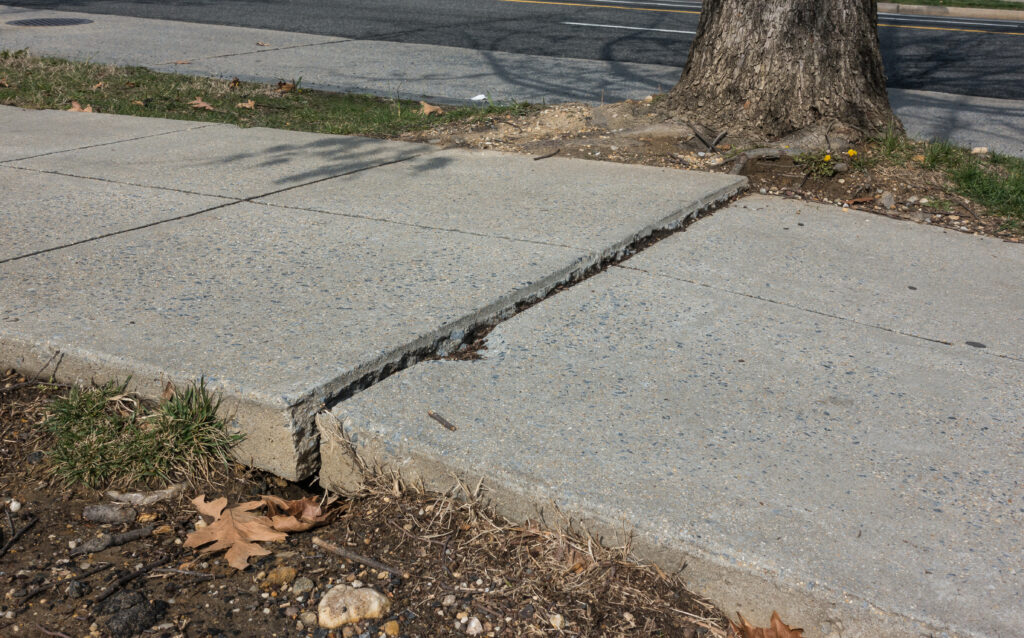Sidewalk fall accidents are probably one of the most common types of fall accidents in Philadelphia. A pedestrian who trips or slips and falls on a sidewalk in Philadelphia often wants to know whether they have legal rights to obtain compensation for their injuries and financial losses like medical bills and lost wages. The answer is fairly complex for two reasons.
First, even though a sidewalk fall accident lawsuit might sound fairly straightforward, these types of cases are in fact, fairly complex. That’s because of the legal issues commonly involved in fall accident cases, such as the status of the injured individual or whether there is sufficient evidence of notice. In addition, there is an entirely separate analysis of liability for snowy or icy conditions of sidewalk.
Second, the legal claims and issues differ depending on who the defendant is, i.e., who is the party responsible for the property where the accident occurred? Private individuals, public business and government entities are all treated differently when it comes to a sidewalk fall accident lawsuit.
When are Private Individuals Liable?
Private individuals such as homeowners have a general duty to repair unreasonably dangerous conditions or warn others of a condition which is not immediately apparent (i.e., a hidden defect). This duty differs from the duty public businesses owe to customers (see below).
Related: Fall Down Accidents-Slip and Fall, Trip and Fall Cases in Pennsylvania (Part One)
Under Pennsylvania fall accident law, pedestrians walking on residential sidewalks are generally considered as licensees. A licensee (i.e., pedestrian) has express or implied permission of the property owner to be on the property. Therefore, from a legal standpoint, the property owner is required to either repair unreasonably dangerous conditions or otherwise warn pedestrians about them. This legal principle applies to defective conditions like broken concrete, large gaps, large uneven areas, etc.
When are Public Businesses Liable?
Public businesses like a store, mall, restaurant, etc., owe customers a heightened duty. Businesses owe customers the same duty that private individuals owe to people walking on sidewalks, plus an extra duty: the duty to conduct reasonable inspections of the property to uncover unreasonably dangerous conditions. That’s because under Pennsylvania law, customers are considered invitees, i.e., people invited to the property for the benefit of the business. Therefore, businesses are required make their stores and immediate areas, like parking lots and sidewalks, reasonably safe for customers.
More: Damages in a Pennsylvania Slip, Trip & Fall Accident Case
When are Government Entities Liable?
Government entities in Pennsylvania can be held liable for sidewalk accidents. Government entities are either state entities like the Pennsylvania Department of Transportation or SEPTA or local entities like the City of Philadelphia or county governments. These cases are complicated by two separate laws in PA: the Tort Claims Act which applies to local entities and the Sovereign Immunity Act which applies to state entities.
Liability for sidewalk accidents is clearly laid out in both laws. However, what an individual injured in a sidewalk accident has to prove in a case against a government entity depends on the type of entity, local or state. Sidewalk fall accident cases against local entities like the City of Philadelphia are harder to prove than cases against state entities like SEPTA. The Tort Claims Act specifically requires the plaintiff to prove two things: 1. the local government had notice of the defect in the sidewalk, and 2. the entity had notice at a sufficient time prior to the accident in order to have fixed the condition. These principles apply to sidewalks abutting properties owned or otherwise controlled by government entities.
However, local governments can be held secondarily liable (i.e., after a private individual or business) for sidewalk accidents which occur on private property. For example, the City of Philadelphia may be held liable for a sidewalk accident which occurs in front of a private residence in Center City. The homeowner is primarily liable, and the City is secondarily liable.
In addition, it is important to note that lawsuits against state or local government entities must comply with other legal requirements. Most importantly, individuals who intend to bring lawsuits against PA governments must provide notice to the appropriate entities prior to filing a lawsuit. The notice must be sent within 6 months of the date of the accident and must contain specific information such as the nature of the defect alleged and the names/addresses of medical treatment providers.
DISCLAIMER: This website does not create any attorney-client relationship or provide legal advice. It is crucial to speak to a qualified lawyer prior to making any decision about your case. Read full disclaimer at the bottom of this page.

